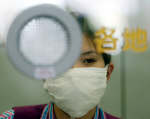 Vacation plans are scrapped, shopping malls are nearly deserted and restaurant staff wait nervously to serve diners who never show up.
Vacation plans are scrapped, shopping malls are nearly deserted and restaurant staff wait nervously to serve diners who never show up.
China's admission that the SARS virus is far more widespread than previously acknowledged is taking the shine off an economy that has been the envy of the region, analysts said on Monday.
On Sunday, the government said the number of cases of Severe Acute Respiratory Syndrome cases in Beijing was almost 10 times higher than previously reported. The government sacked Health Minister Zhang Wenkang and Beijing Mayor Meng Xuenong.
Nearly 80 people are known to have died in China and more than 1,800 infections have been reported, accounting for nearly half the world total.
Many economists say it is too early to give specific estimates of the economic toll, but the impact of SARS on daily activity in Beijing is evident.
"Normally the road to the market is so jammed with cars you can't even get through," said Chen Li, a Beijing musician who lives near a major antique and furniture market.
"These past few days it has been empty and even bicycles are few and far between," Chen said.
Growth seen slowing
Sparkling upscale shopping malls with their marble tiles have been turned into virtual echo chambers as customers, fearful of contracting the potentially deadly virus, opt to delay purchases.
Meanwhile, turnips, garlic, bleach and face masks have become hot commodities as people scramble to stock up on items said to guard against SARS.
China also cancelled the week-long May Day national holiday, known as "Golden Week" for its booster effect on tourism and consumer spending, dealing a blow to travel agencies and hotels.
"So far we are still looking at the impact on GDP coming from reduced demand for services," said Yiping Huang, an Asia-Pacific economist with Salomon Smith Barney in Hong Kong.
China seems in little danger of missing its official growth target of seven percent for the full year, but the outbreak all but ensures the second quarter won't match the stunning 9.9 percent growth during the year to the first quarter.
Huang said he had lowered his forecast for the rise in full-year gross domestic product to 7.3 percent from 7.6 percent.
That could come down further if China fails to contain SARS, leading to factory closures or a reduction in foreign investment, which has been a key economic driver, Huang said.
"There are other implications we will assess later on, like the impact on the supply of manufactured goods or whether they will start to close down factories," Huang said. "These are certainly areas we are keeping an eye on."
Economists have also said they would watch for the impact on a giant twice-yearly trade fair currently being held in Guangdong, the booming southern province where SARS is believed to have originated.
Officials have not given attendance figures, but anecdotal evidence suggests participation in the fair, especially by foreign businesses, is down dramatically.
Not like Hong Kong, yet
Analysts said China has a few things in its favour to help it weather the spread of SARS.
Its population of 1.3 billion means the proportion of those with the disease is very low. Tourism makes up only a few percent of the economy. And the country's vast size means SARS will spread more slowly than in regions like Hong Kong.
Last week, the State Statistical Bureau said SARS would hit the economy later this year, but estimated the impact would be modest and largely limited to tourism, retailing and catering.
"This is definitely a negative for local consumption, but I reiterate the point that it's not anything like what we're seeing in Hong Kong and Singapore," said Paul Cairns, an analyst with IDEALglobal in Singapore.
"The risk is that the disease continues to spread, so if we start talking many thousands of people infected, and the widespread panic like we've seen in Hong Kong, then we'll see more of an impact," Cairns said.






